Radu Florian
LMK > CLS: Landmark Pooling for Dense Embeddings
Jan 29, 2026Abstract:Representation learning is central to many downstream tasks such as search, clustering, classification, and reranking. State-of-the-art sequence encoders typically collapse a variable-length token sequence to a single vector using a pooling operator, most commonly a special [CLS] token or mean pooling over token embeddings. In this paper, we identify systematic weaknesses of these pooling strategies: [CLS] tends to concentrate information toward the initial positions of the sequence and can under-represent distributed evidence, while mean pooling can dilute salient local signals, sometimes leading to worse short-context performance. To address these issues, we introduce Landmark (LMK) pooling, which partitions a sequence into chunks, inserts landmark tokens between chunks, and forms the final representation by mean-pooling the landmark token embeddings. This simple mechanism improves long-context extrapolation without sacrificing local salient features, at the cost of introducing a small number of special tokens. We empirically demonstrate that LMK pooling matches existing methods on short-context retrieval tasks and yields substantial improvements on long-context tasks, making it a practical and scalable alternative to existing pooling methods.
DialectalArabicMMLU: Benchmarking Dialectal Capabilities in Arabic and Multilingual Language Models
Oct 31, 2025Abstract:We present DialectalArabicMMLU, a new benchmark for evaluating the performance of large language models (LLMs) across Arabic dialects. While recently developed Arabic and multilingual benchmarks have advanced LLM evaluation for Modern Standard Arabic (MSA), dialectal varieties remain underrepresented despite their prevalence in everyday communication. DialectalArabicMMLU extends the MMLU-Redux framework through manual translation and adaptation of 3K multiple-choice question-answer pairs into five major dialects (Syrian, Egyptian, Emirati, Saudi, and Moroccan), yielding a total of 15K QA pairs across 32 academic and professional domains (22K QA pairs when also including English and MSA). The benchmark enables systematic assessment of LLM reasoning and comprehension beyond MSA, supporting both task-based and linguistic analysis. We evaluate 19 open-weight Arabic and multilingual LLMs (1B-13B parameters) and report substantial performance variation across dialects, revealing persistent gaps in dialectal generalization. DialectalArabicMMLU provides the first unified, human-curated resource for measuring dialectal understanding in Arabic, thus promoting more inclusive evaluation and future model development.
Contrastive Retrieval Heads Improve Attention-Based Re-Ranking
Oct 02, 2025Abstract:The strong zero-shot and long-context capabilities of recent Large Language Models (LLMs) have paved the way for highly effective re-ranking systems. Attention-based re-rankers leverage attention weights from transformer heads to produce relevance scores, but not all heads are created equally: many contribute noise and redundancy, thus limiting performance. To address this, we introduce CoRe heads, a small set of retrieval heads identified via a contrastive scoring metric that explicitly rewards high attention heads that correlate with relevant documents, while downplaying nodes with higher attention that correlate with irrelevant documents. This relative ranking criterion isolates the most discriminative heads for re-ranking and yields a state-of-the-art list-wise re-ranker. Extensive experiments with three LLMs show that aggregated signals from CoRe heads, constituting less than 1% of all heads, substantially improve re-ranking accuracy over strong baselines. We further find that CoRe heads are concentrated in middle layers, and pruning the computation of final 50% of model layers preserves accuracy while significantly reducing inference time and memory usage.
Optimal Policy Minimum Bayesian Risk
May 22, 2025Abstract:Inference scaling can help LLMs solve complex reasoning problems through extended runtime computation. On top of targeted supervision for long chain-of-thought (long-CoT) generation, purely inference-time techniques such as best-of-N (BoN) sampling, majority voting, or more generally, minimum Bayes risk decoding (MBRD), can further improve LLM accuracy by generating multiple candidate solutions and aggregating over them. These methods typically leverage additional signals in the form of reward models and risk/similarity functions that compare generated samples, e.g., exact match in some normalized space or standard similarity metrics such as Rouge. Here we present a novel method for incorporating reward and risk/similarity signals into MBRD. Based on the concept of optimal policy in KL-controlled reinforcement learning, our framework provides a simple and well-defined mechanism for leveraging such signals, offering several advantages over traditional inference-time methods: higher robustness, improved accuracy, and well-understood asymptotic behavior. In addition, it allows for the development of a sample-efficient variant of MBRD that can adjust the number of samples to generate according to the difficulty of the problem, without relying on majority vote counts. We empirically demonstrate the advantages of our approach on math (MATH-$500$) and coding (HumanEval) tasks using recent open-source models. We also present a comprehensive analysis of its accuracy-compute trade-offs.
Granite Embedding Models
Feb 27, 2025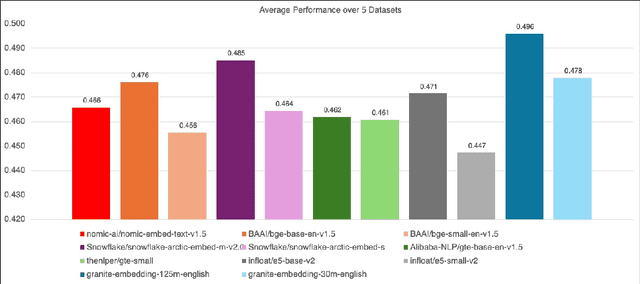



Abstract:We introduce the Granite Embedding models, a family of encoder-based embedding models designed for retrieval tasks, spanning dense-retrieval and sparse retrieval architectures, with both English and Multilingual capabilities. This report provides the technical details of training these highly effective 12 layer embedding models, along with their efficient 6 layer distilled counterparts. Extensive evaluations show that the models, developed with techniques like retrieval oriented pretraining, contrastive finetuning, knowledge distillation, and model merging significantly outperform publicly available models of similar sizes on both internal IBM retrieval and search tasks, and have equivalent performance on widely used information retrieval benchmarks, while being trained on high-quality data suitable for enterprise use. We publicly release all our Granite Embedding models under the Apache 2.0 license, allowing both research and commercial use at https://huggingface.co/collections/ibm-granite.
Multi-Document Grounded Multi-Turn Synthetic Dialog Generation
Sep 17, 2024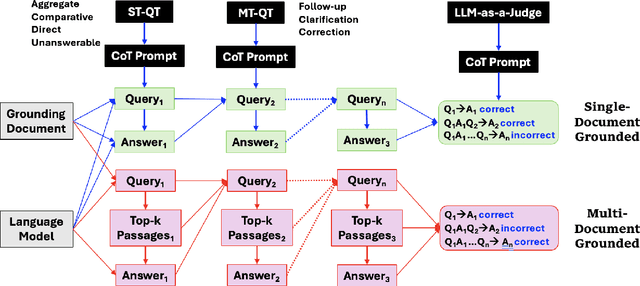


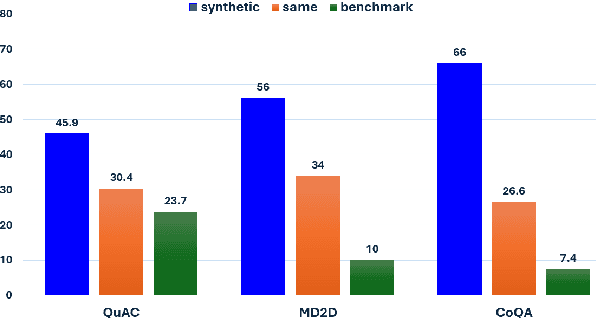
Abstract:We introduce a technique for multi-document grounded multi-turn synthetic dialog generation that incorporates three main ideas. First, we control the overall dialog flow using taxonomy-driven user queries that are generated with Chain-of-Thought (CoT) prompting. Second, we support the generation of multi-document grounded dialogs by mimicking real-world use of retrievers to update the grounding documents after every user-turn in the dialog. Third, we apply LLM-as-a-Judge to filter out queries with incorrect answers. Human evaluation of the synthetic dialog data suggests that the data is diverse, coherent, and includes mostly correct answers. Both human and automatic evaluations of answerable queries indicate that models fine-tuned on synthetic dialogs consistently out-perform those fine-tuned on existing human generated training data across four publicly available multi-turn document grounded benchmark test sets.
Prompts as Auto-Optimized Training Hyperparameters: Training Best-in-Class IR Models from Scratch with 10 Gold Labels
Jun 17, 2024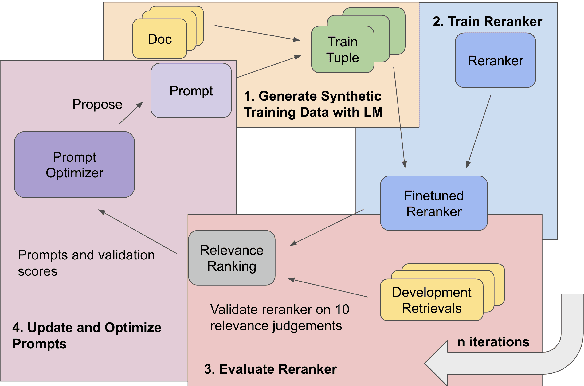
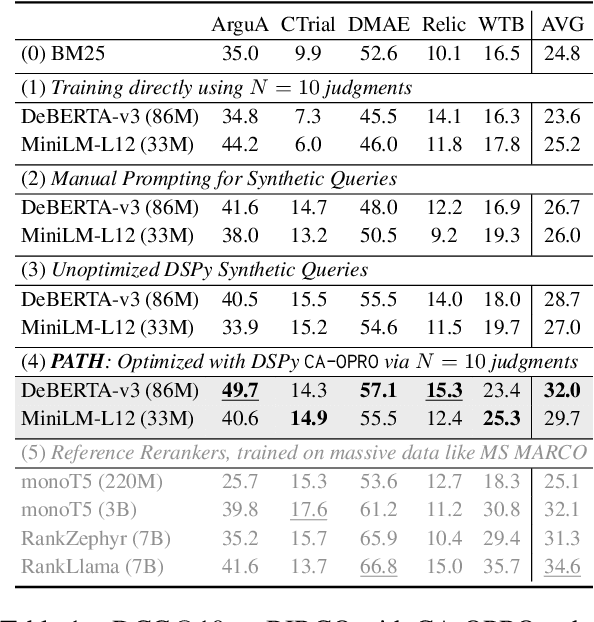
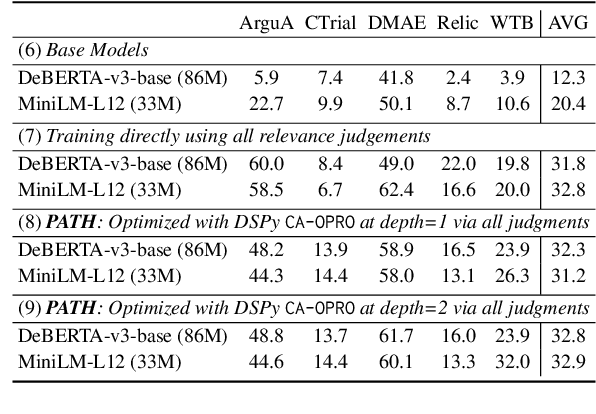
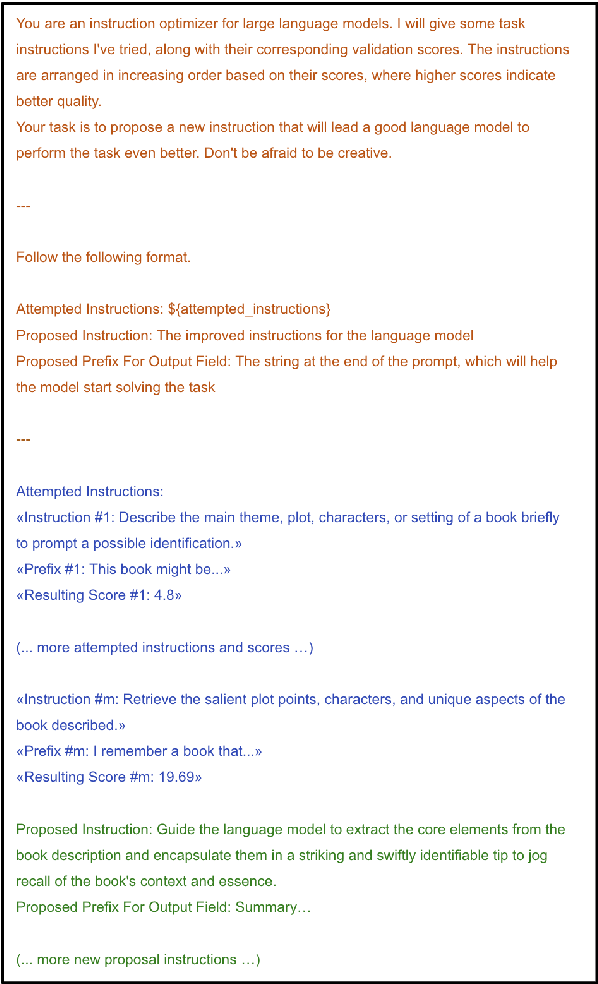
Abstract:We develop a method for training small-scale (under 100M parameter) neural information retrieval models with as few as 10 gold relevance labels. The method depends on generating synthetic queries for documents using a language model (LM), and the key step is that we automatically optimize the LM prompt that is used to generate these queries based on training quality. In experiments with the BIRCO benchmark, we find that models trained with our method outperform RankZephyr and are competitive with RankLLama, both of which are 7B parameter models trained on over 100K labels. These findings point to the power of automatic prompt optimization for synthetic dataset generation.
Can a Multichoice Dataset be Repurposed for Extractive Question Answering?
Apr 26, 2024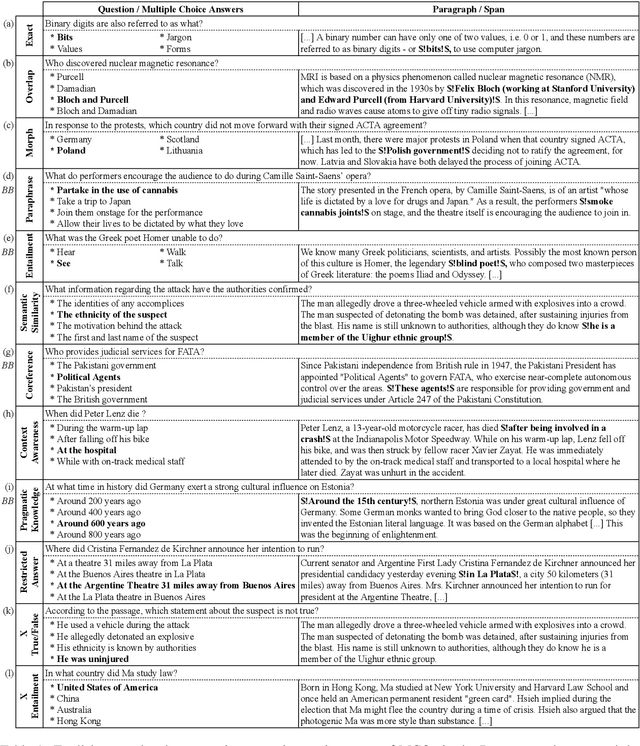

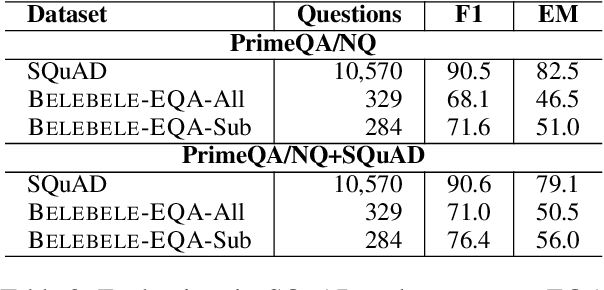
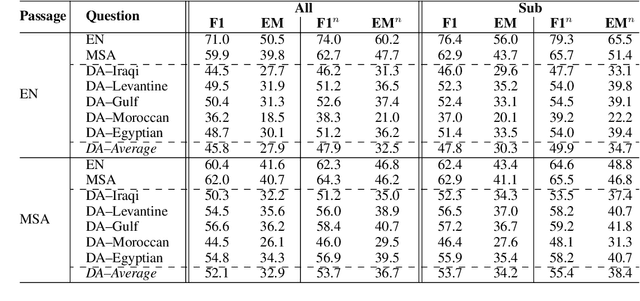
Abstract:The rapid evolution of Natural Language Processing (NLP) has favored major languages such as English, leaving a significant gap for many others due to limited resources. This is especially evident in the context of data annotation, a task whose importance cannot be underestimated, but which is time-consuming and costly. Thus, any dataset for resource-poor languages is precious, in particular when it is task-specific. Here, we explore the feasibility of repurposing existing datasets for a new NLP task: we repurposed the Belebele dataset (Bandarkar et al., 2023), which was designed for multiple-choice question answering (MCQA), to enable extractive QA (EQA) in the style of machine reading comprehension. We present annotation guidelines and a parallel EQA dataset for English and Modern Standard Arabic (MSA). We also present QA evaluation results for several monolingual and cross-lingual QA pairs including English, MSA, and five Arabic dialects. Our aim is to enable others to adapt our approach for the 120+ other language variants in Belebele, many of which are deemed under-resourced. We also conduct a thorough analysis and share our insights from the process, which we hope will contribute to a deeper understanding of the challenges and the opportunities associated with task reformulation in NLP research.
CLAPNQ: Cohesive Long-form Answers from Passages in Natural Questions for RAG systems
Apr 02, 2024Abstract:Retrieval Augmented Generation (RAG) has become a popular application for large language models. It is preferable that successful RAG systems provide accurate answers that are supported by being grounded in a passage without any hallucinations. While considerable work is required for building a full RAG pipeline, being able to benchmark performance is also necessary. We present ClapNQ, a benchmark Long-form Question Answering dataset for the full RAG pipeline. ClapNQ includes long answers with grounded gold passages from Natural Questions (NQ) and a corpus to perform either retrieval, generation, or the full RAG pipeline. The ClapNQ answers are concise, 3x smaller than the full passage, and cohesive, with multiple pieces of the passage that are not contiguous. RAG models must adapt to these properties to be successful at ClapNQ. We present baseline experiments and analysis for ClapNQ that highlight areas where there is still significant room for improvement in grounded RAG. CLAPNQ is publicly available at https://github.com/primeqa/clapnq
Self-Refinement of Language Models from External Proxy Metrics Feedback
Feb 27, 2024



Abstract:It is often desirable for Large Language Models (LLMs) to capture multiple objectives when providing a response. In document-grounded response generation, for example, agent responses are expected to be relevant to a user's query while also being grounded in a given document. In this paper, we introduce Proxy Metric-based Self-Refinement (ProMiSe), which enables an LLM to refine its own initial response along key dimensions of quality guided by external metrics feedback, yielding an overall better final response. ProMiSe leverages feedback on response quality through principle-specific proxy metrics, and iteratively refines its response one principle at a time. We apply ProMiSe to open source language models Flan-T5-XXL and Llama-2-13B-Chat, to evaluate its performance on document-grounded question answering datasets, MultiDoc2Dial and QuAC, demonstrating that self-refinement improves response quality. We further show that fine-tuning Llama-2-13B-Chat on the synthetic dialogue data generated by ProMiSe yields significant performance improvements over the zero-shot baseline as well as a supervised fine-tuned model on human annotated data.
 Add to Chrome
Add to Chrome Add to Firefox
Add to Firefox Add to Edge
Add to Edge